Ward A.W. The Cambridge History of British Foreign Policy. 1783-1919. Volume 3
Подождите немного. Документ загружается.

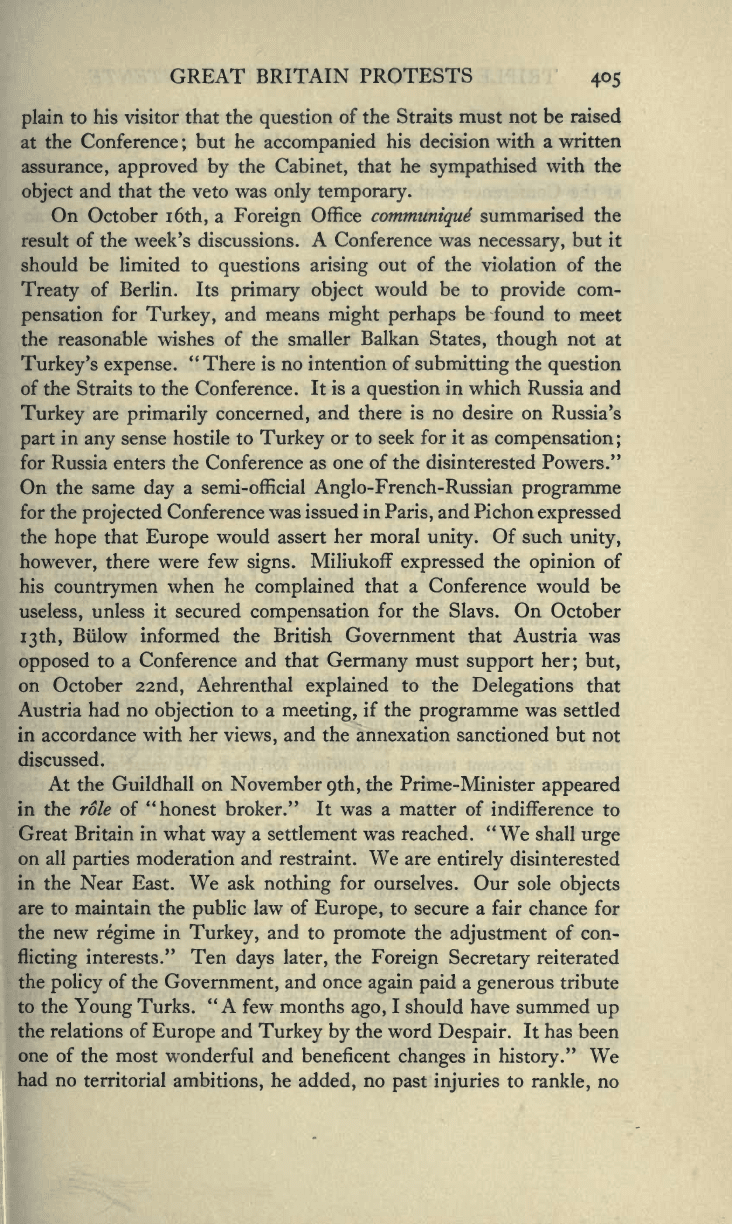
GREAT
BRITAIN PROTESTS
405
plain
to
his visitor that the
question
of the Straits
must not
be raised
at the
Conference
;
but he
accompanied
his
decision with
a written
assurance,
approved by
the
Cabinet,
that
he
sympathised
with
the
object
and that the
veto
was
only
temporary.
On
October
16th,
a
Foreign
Office
communique
summarised the
result
of
the week's
discussions.
A Conference
was
necessary,
but it
should be limited
to
questions
arising
out
of
the
violation
of
the
Treaty
of Berlin. Its
primary
object
would
be to
provide
com-
pensation
for
Turkey,
and
means
might
perhaps
be found
to meet
the reasonable
wishes of
the
smaller
Balkan
States,
though
not at
Turkey's
expense.
"
There is
no
intention
of
submitting
the
question
of
the Straits to the Conference.
It
is a
question
in which
Russia and
Turkey
are
primarily
concerned,
and there is
no
desire
on
Russia's
part
in
any
sense hostile to
Turkey
or
to seek
for
it as
compensation
;
for
Russia
enters the
Conference
as
one of
the
disinterested
Powers."
On
the same
day
a semi-official
Anglo-French-Russian
programme
for
the
projected
Conference
was
issued
in
Paris,
and Pichon
expressed
the
hope
that
Europe
would assert
her
moral
unity.
Of
such
unity,
however,
there
were few
signs.
Miliukoff
expressed
the
opinion
of
his
countrymen
when he
complained
that
a
Conference would
be
useless,
unless it
secured
compensation
for
the Slavs. On
October
13th,
Biilow
informed
the British
Government that Austria
was
opposed
to
a Conference and that
Germany
must
support
her;
but,
on October
22nd,
Aehrenthal
explained
to the
Delegations
that
Austria had no
objection
to a
meeting,
if the
programme
was
settled
in accordance with her
views,
and the annexation
sanctioned
but not
discussed.
At the
Guildhall on November
9th,
the
Prime-Minister
appeared
in
the
role
of
"honest
broker." It was a
matter
of
indifference
to
Great
Britain
in
what
way
a
settlement
was
reached. "We
shall
urge
on all
parties
moderation and restraint. We are
entirely
disinterested
in
the Near East. We ask
nothing
for
ourselves.
Our
sole
objects
are
to maintain the
public
law
of
Europe,
to secure a fair
chance for
the
new
regime
in
Turkey,
and
to
promote
the
adjustment
of con-
flicting
interests." Ten
days
later,
the
Foreign
Secretary
reiterated
the
policy
of
the
Government,
and once
again paid
a
generous
tribute
to the
Young
Turks.
"A
few
months
ago,
I
should have
summed
up
the
relations
of
Europe
and
Turkey by
the
word
Despair.
It
has
been
one of
the
most
wonderful
and
beneficent
changes
in
history."
We
had
no
territorial
ambitions,
he
added,
no
past
injuries
to
rankle,
no
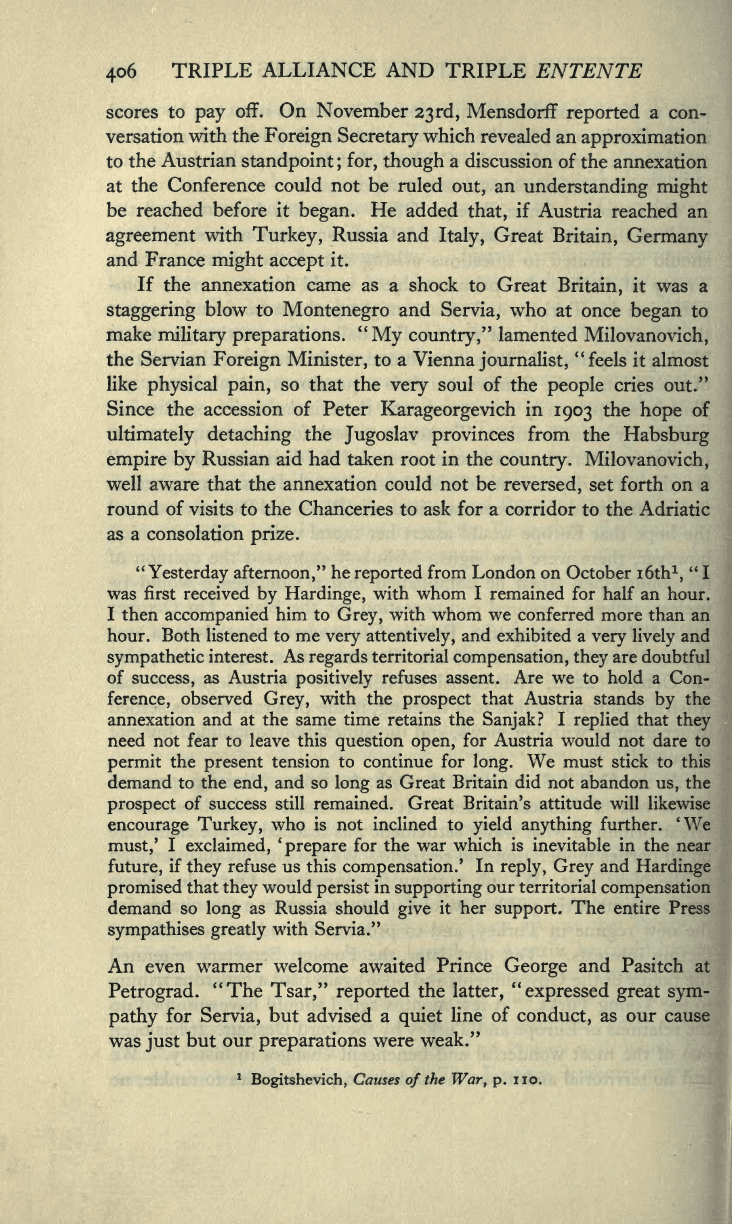
406
TRIPLE
ALLIANCE
AND
TRIPLE ENTENTE
scores to
pay
off. On November
23rd,
MensdorfT
reported
a
con-
versation
with the
Foreign
Secretary
which
revealed
an
approximation
to
the
Austrian
standpoint
; for,
though
a
discussion
of
the annexation
at
the
Conference could
not
be
ruled
out,
an
understanding might
be
reached before
it
began.
He added
that,
if
Austria reached an
agreement
with
Turkey,
Russia and
Italy,
Great
Britain,
Germany
and France
might accept
it.
If
the annexation
came
as a shock
to Great
Britain,
it
was a
staggering
blow
to
Montenegro
and
Servia,
who
at once
began
to
make
military
preparations.
"My
country/'
lamented
Milovanovich,
the
Servian
Foreign
Minister,
to
a
Vienna
journalist,
"feels
it almost
like
physical
pain,
so
that the
very
soul of
the
people
cries
out."
Since
the
accession
of
Peter
Karageorgevich
in
1903
the
hope
of
ultimately detaching
the
Jugoslav provinces
from
the
Habsburg
empire
by
Russian
aid had
taken root
in
the
country.
Milovanovich,
well aware
that the
annexation could
not be
reversed,
set forth on a
round of
visits to the Chanceries
to
ask for a corridor
to the Adriatic
as a
consolation
prize.
"
Yesterday
afternoon,"
he
reported
from London on
October 16th
1
,
"
I
was first
received
by Hardinge,
with whom I
remained for half an
hour.
I then
accompanied
him to
Grey,
with whom we
conferred more than an
hour.
Both
listened to me
very attentively,
and
exhibited
a
very lively
and
sympathetic
interest. As
regards
territorial
compensation,
they
are doubtful
of
success,
as Austria
positively
refuses
assent.
Are we to hold
a Con-
ference,
observed
Grey,
with the
prospect
that Austria
stands
by
the
annexation
and at the same time retains the
Sanjak?
I
replied
that
they
need not fear to leave this
question open,
for
Austria
would
not dare to
permit
the
present
tension
to
continue
for
long.
We
must stick to this
demand to the
end,
and so
long
as Great
Britain
did
not abandon
us,
the
prospect
of
success still remained. Great
Britain's
attitude
will
likewise
encourage
Turkey,
who
is
not inclined to
yield
anything
further.
'We
must,'
I
exclaimed,
'prepare
for the
war which is
inevitable
in
the near
future,
if
they
refuse
us
this
compensation.'
In
reply,
Grey
and
Hardinge
promised
that
they
would
persist
in
supporting
our
territorial
compensation
demand
so
long
as Russia should
give
it her
support.
The entire Press
sympathises
greatly
with
Servia."
An even
warmer
welcome awaited
Prince
George
and
Pasitch
at
Petrograd.
"The
Tsar,"
reported
the
latter,
"expressed
great sym-
pathy
for
Servia,
but
advised
a
quiet
line of
conduct,
as our cause
was
just
but
our
preparations
were
weak."
1
Bogitshevich,
Causes
of
the
War,
p.
no.
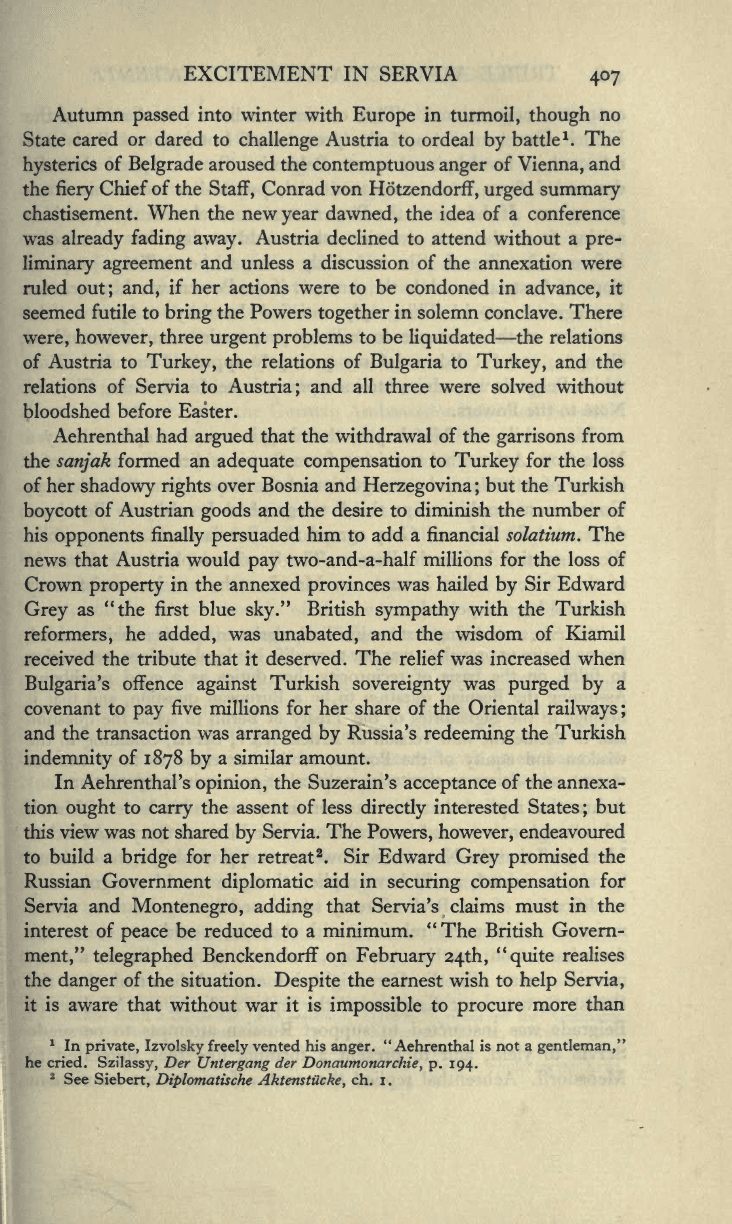
EXCITEMENT IN SERVIA
407
Autumn
passed
into
winter with
Europe
in
turmoil,
though
no
State
cared
or
dared
to
challenge
Austria
to
ordeal
by
battle
1
. The
hysterics
of
Belgrade
aroused
the
contemptuous
anger
of
Vienna,
and
the
fiery
Chief
of
the
Staff,
Conrad von
Hotzendorff,
urged
summary
chastisement.
When
the
new
year
dawned,
the
idea
of a
conference
was
already
fading
away.
Austria declined
to
attend
without
a
pre-
liminary agreement
and unless a discussion of
the
annexation
were
ruled
out; and,
if
her
actions
were to be
condoned in
advance,
it
seemed
futile to
bring
the Powers
together
in solemn
conclave.
There
were, however,
three
urgent
problems
to be
liquidated
—
the relations
of Austria to
Turkey,
the
relations
of
Bulgaria
to
Turkey,
and the
relations
of Servia
to
Austria;
and
all three were solved
without
bloodshed
before
Easter.
Aehrenthal
had
argued
that
the withdrawal
of
the
garrisons
from
the
sanjak
formed
an
adequate
compensation
to
Turkey
for
the
loss
of her
shadowy rights
over
Bosnia and
Herzegovina
;
but the
Turkish
boycott
of Austrian
goods
and
the desire to
diminish
the
number of
his
opponents
finally
persuaded
him
to
add a financial solatium. The
news that Austria
would
pay
two-and-a-half
millions for
the
loss
of
Crown
property
in
the
annexed
provinces
was hailed
by
Sir Edward
Grey
as
"the
first blue
sky."
British
sympathy
with the
Turkish
reformers,
he
added,
was
unabated,
and
the
wisdom of Kiamil
received the
tribute that it deserved. The relief
was increased
when
Bulgaria's
offence
against
Turkish
sovereignty
was
purged by
a
covenant to
pay
five
millions for
her share
of
the Oriental
railways
;
and
the transaction
was
arranged
by
Russia's
redeeming
the
Turkish
indemnity
of
1878
by
a similar amount.
In Aehrenthal's
opinion,
the
Suzerain's
acceptance
of
the
annexa-
tion
ought
to
carry
the assent
of
less
directly
interested States
;
but
this
view was
not shared
by
Servia. The
Powers, however,
endeavoured
to
build a
bridge
for her
retreat
2
. Sir
Edward
Grey
promised
the
Russian
Government
diplomatic
aid in
securing compensation
for
Servia and
Montenegro,
adding
that Servia's claims
must
in the
interest
of
peace
be reduced
to
a minimum. "The British
Govern-
ment,"
telegraphed
Benckendorff
on
February
24th,
"quite
realises
the
danger
of
the situation.
Despite
the
earnest
wish to
help
Servia,
it
is
aware that
without war it
is
impossible
to
procure
more
than
1
In
private,
Izvolsky freely
vented
his
anger.
"Aehrenthal
is not
a
gentleman,"
he cried.
Szilassy,
Der
Untergang
der Donaumonarckie
,
p. 194.
2
See
Siebert,
Diplomatische
Aktenstticke,
ch. 1.
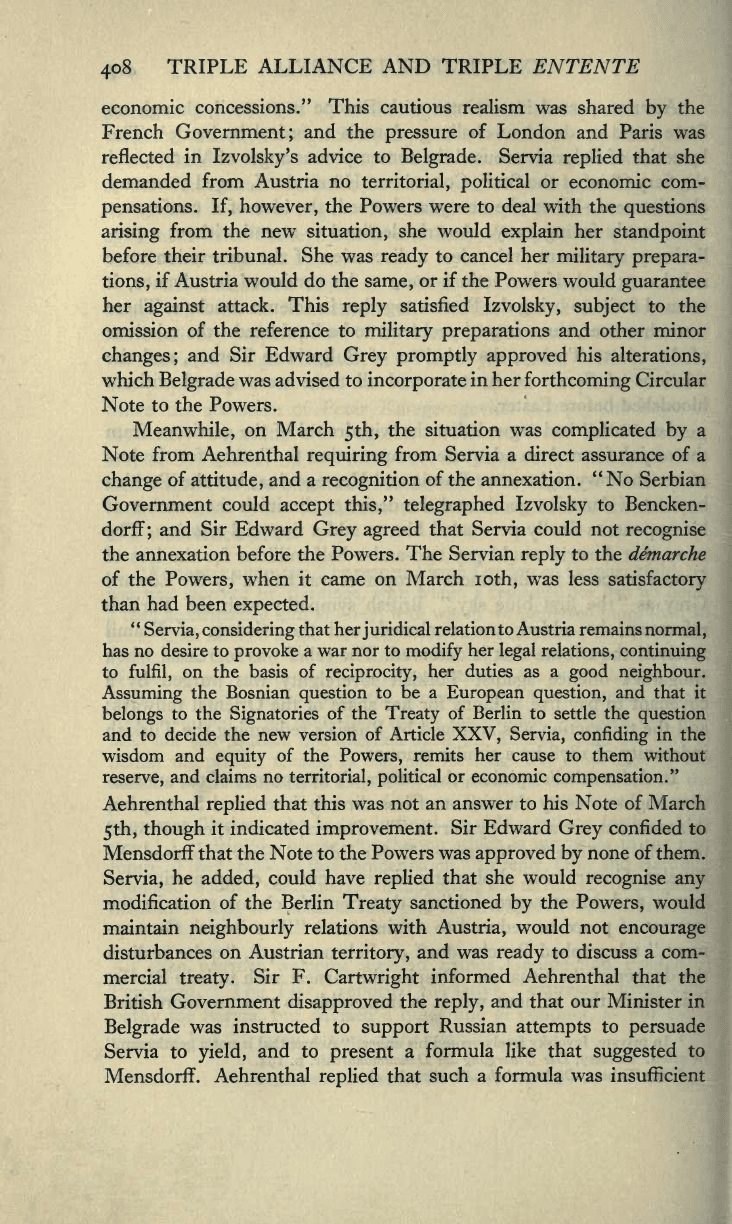
4
o8 TRIPLE
ALLIANCE AND TRIPLE
ENTENTE
economic
concessions."
This
cautious
realism
was
shared
by
the
French
Government;
and the
pressure
of
London and Paris was
reflected
in
Izvolsky's
advice to
Belgrade.
Servia
replied
that
she
demanded
from
Austria
no
territorial,
political
or
economic
com-
pensations.
If,
however,
the
Powers were to deal
with the
questions
arising
from
the new
situation,
she would
explain
her
standpoint
before their tribunal. She
was
ready
to
cancel
her
military prepara-
tions,
if
Austria
would do the
same,
or if
the Powers would
guarantee
her
against
attack.
This
reply
satisfied
Izvolsky, subject
to the
omission
of
the reference to
military
preparations
and
other
minor
changes;
and Sir Edward
Grey promptly
approved
his
alterations,
which
Belgrade
was advised to
incorporate
in
her
forthcoming
Circular
Note
to the
Powers.
Meanwhile,
on March
5th,
the situation
was
complicated
by
a
Note
from
Aehrenthal
requiring
from Servia a
direct assurance
of
a
change
of
attitude,
and a
recognition
of
the annexation.
"
No Serbian
Government
could
accept
this,"
telegraphed Izvolsky
to Bencken-
dorff
;
and Sir Edward
Grey agreed
that
Servia could
not
recognise
the annexation before the
Powers.
The
Servian
reply
to the demarche
of
the
Powers,
when it
came on March
10th,
was less
satisfactory
than
had
been
expected.
"
Servia,
considering
that her
juridical
relation to Austria
remains
normal,
has
no desire to
provoke
a war
nor to
modify
her
legal
relations,
continuing
to
fulfil,
on
the
basis
of
reciprocity,
her duties
as a
good neighbour.
Assuming
the Bosnian
question
to be
a
European question,
and
that
it
belongs
to the
Signatories
of the
Treaty
of Berlin to
settle the
question
and to decide the new version
of
Article
XXV,
Servia,
confiding
in
the
wisdom
and
equity
of the
Powers,
remits
her cause to them
without
reserve,
and claims
no
territorial,
political
or economic
compensation."
Aehrenthal
replied
that this
was
not
an answer
to
his
Note
of
March
5th,
though
it indicated
improvement.
Sir Edward
Grey
confided
to
MensdorfT that
the
Note to the
Powers
was
approved
by
none
of
them.
Servia,
he
added,
could have
replied
that she would
recognise
any
modification
of
the Berlin
Treaty
sanctioned
by
the
Powers,
would
maintain
neighbourly
relations
with
Austria,
would
not
encourage
disturbances
on
Austrian
territory,
and was
ready
to
discuss a com-
mercial
treaty.
Sir
F.
Cartwright
informed
Aehrenthal
that
the
British
Government
disapproved
the
reply,
and
that
our
Minister
in
Belgrade
was instructed to
support
Russian
attempts
to
persuade
Servia to
yield,
and
to
present
a
formula
like that
suggested
to
MensdorfT.
Aehrenthal
replied
that
such
a formula was insufficient
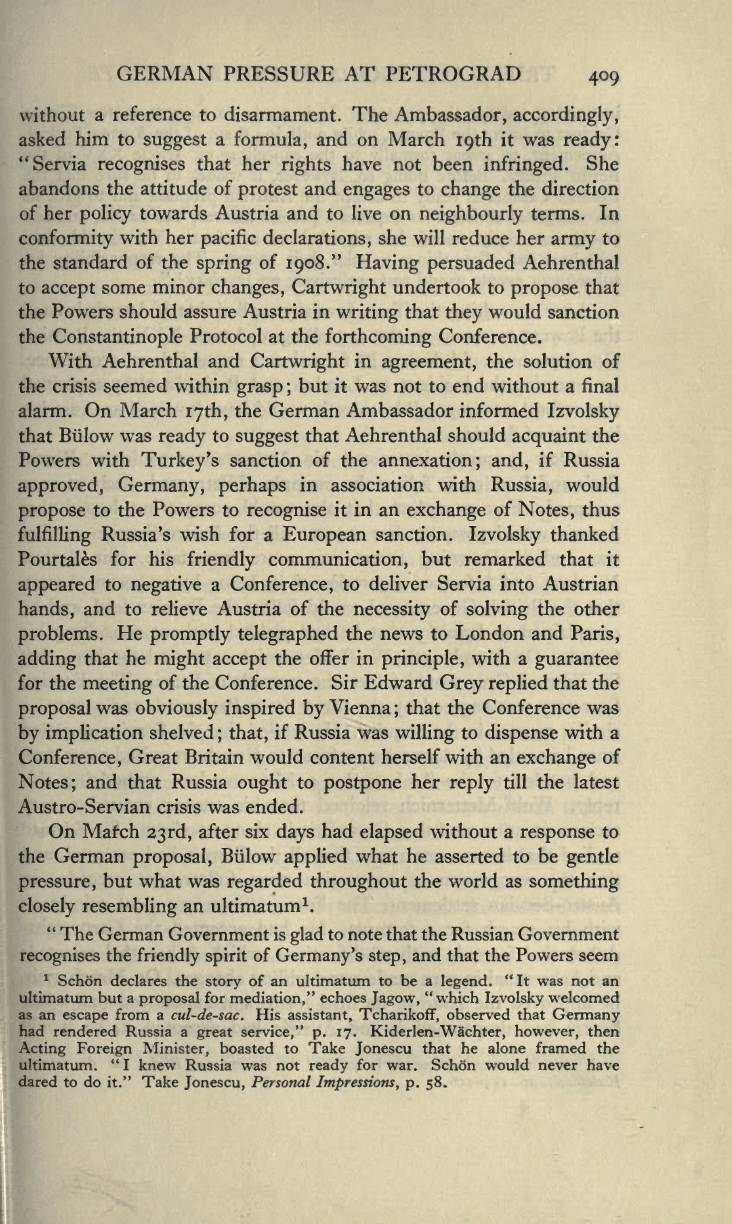
GERMAN
PRESSURE AT PETROGRAD
409
without
a reference
to
disarmament.
The
Ambassador,
accordingly,
asked
him
to
suggest
a
formula,
and on
March
19th
it was
ready:
"Servia
recognises
that her
rights
have
not
been
infringed.
She
abandons
the attitude
of
protest
and
engages
to
change
the
direction
of her
policy
towards
Austria
and
to
live on
neighbourly
terms.
In
conformity
with
her
pacific
declarations,
she
will reduce her
army
to
the
standard
of
the
spring
of
1908." Having persuaded
Aehrenthal
to
accept
some
minor
changes, Cartwright
undertook
to
propose
that
the
Powers
should
assure Austria in
writing
that
they
would
sanction
the
Constantinople
Protocol at the
forthcoming
Conference.
With
Aehrenthal
and
Cartwright
in
agreement,
the solution of
the
crisis seemed within
grasp
;
but
it
was
not
to end
without
a final
alarm. On
March
17th,
the German
Ambassador
informed
Izvolsky
that
Biilow
was
ready
to
suggest
that
Aehrenthal
should
acquaint
the
Powers
with
Turkey's
sanction
of
the
annexation; and,
if
Russia
approved, Germany, perhaps
in
association
with
Russia,
would
propose
to the
Powers
to
recognise
it
in
an
exchange
of
Notes,
thus
fulfilling
Russia's
wish for
a
European
sanction.
Izvolsky
thanked
Pourtales
for his
friendly
communication,
but
remarked
that it
appeared
to
negative
a
Conference,
to
deliver Servia
into Austrian
hands,
and
to
relieve
Austria
of
the
necessity
of
solving
the other
problems.
He
promptly telegraphed
the
news
to
London
and
Paris,
adding
that
he
might
accept
the
offer in
principle,
with
a
guarantee
for
the
meeting
of
the
Conference. Sir
Edward
Grey
replied
that
the
proposal
was
obviously
inspired by
Vienna
;
that the
Conference
was
by
implication
shelved
; that,
if Russia was
willing
to
dispense
with
a
Conference,
Great Britain
would
content
herself
with
an
exchange
of
Notes;
and
that
Russia
ought
to
postpone
her
reply
till the latest
Austro-
Servian crisis was ended.
On March
23
rd,
after
six
days
had
elapsed
without
a
response
to
the
German
proposal,
Biilow
applied
what
he
asserted to
be
gentle
pressure,
but what
was
regarded throughout
the
world as
something
closely resembling
an
ultimatum
1
.
11
The
German Government
is
glad
to note that
the Russian Government
recognises
the
friendly spirit
of
Germany's step,
and that the Powers seem
1
Schon
declares the
story
of an ultimatum
to
be
a
legend.
"
It was not
an
ultimatum
but
a
proposal
for
mediation,"
echoes
Jagow,
"which
Izvolsky
welcomed
as
an
escape
from a
cul-de-sac.
His
assistant,
Tcharikoff,
observed that
Germany
had
rendered
Russia
a
great
service,"
p.
17.
Kiderlen-Wachter, however,
then
Acting Foreign Minister,
boasted to
Take
Jonescu
that
he alone
framed
the
ultimatum.
"
I knew
Russia
was
not
ready
for
war. Schon would
never
have
dared
to do
it."
Take
Jonescu,
Personal
Impressions,
p.
58.
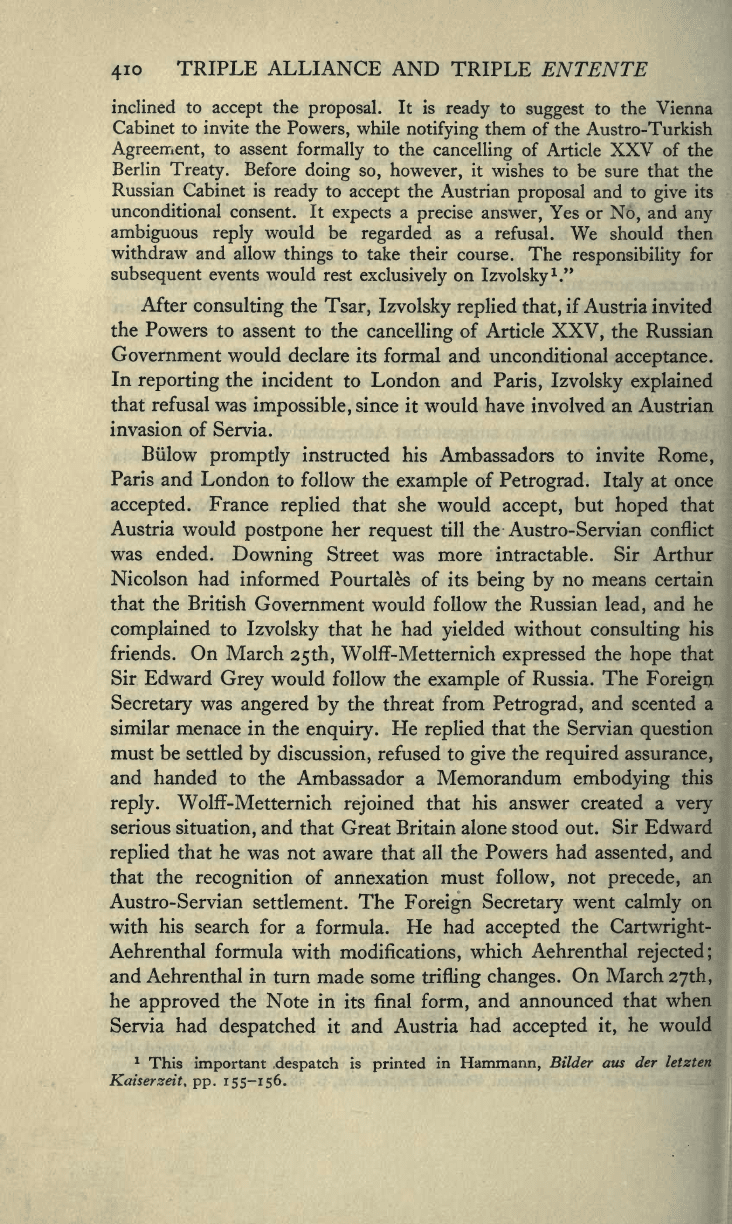
410
TRIPLE
ALLIANCE AND
TRIPLE ENTENTE
inclined
to
accept
the
proposal.
It
is
ready
to
suggest
to the Vienna
Cabinet to
invite the
Powers,
while
notifying
them
of
the Austro-Turkish
Agreement,
to
assent
formally
to
the
cancelling
of
Article
XXV of
the
Berlin
Treaty.
Before
doing
so, however,
it
wishes to
be sure
that the
Russian
Cabinet
is
ready
to
accept
the
Austrian
proposal
and to
give
its
unconditional
consent.
It
expects
a
precise
answer,
Yes
or
No,
and
any
ambiguous
reply
would
be
regarded
as a
refusal.
We should
then
withdraw
and
allow
things
to
take their
course.
The
responsibility
for
subsequent
events would
rest
exclusively
on
Izvolsky
1
."
After
consulting
the
Tsar,
Izvolsky
replied
that,
if
Austria invited
the Powers
to
assent to
the
cancelling
of
Article
XXV,
the
Russian
Government
would
declare
its
formal and
unconditional
acceptance.
In
reporting
the
incident to
London
and
Paris,
Izvolsky explained
that refusal was
impossible,
since
it
would
have involved
an
Austrian
invasion
of
Servia.
Biilow
promptly
instructed
his
Ambassadors
to invite
Rome,
Paris and
London
to follow
the
example
of
Petrograd.
Italy
at
once
accepted.
France
replied
that she would
accept,
but
hoped
that
Austria would
postpone
her
request
till the
Austro-Servian conflict
was ended.
Downing
Street
was more
intractable.
Sir
Arthur
Nicolson
had
informed
Pourtales
of
its
being
by
no means
certain
that the
British
Government
would follow the
Russian
lead,
and he
complained
to
Izvolsky
that he
had
yielded
without
consulting
his
friends.
On
March
25th,
WolfT-Metternich
expressed
the
hope
that
Sir
Edward
Grey
would
follow
the
example
of
Russia.
The
Foreign
Secretary
was
angered by
the threat
from
Petrograd,
and
scented
a
similar
menace in
the
enquiry.
He
replied
that
the Servian
question
must
be
settled
by
discussion,
refused to
give
the
required
assurance,
and handed
to
the Ambassador
a Memorandum
embodying
this
reply.
Wolff-Metternich
rejoined
that
his
answer
created a
very
serious
situation,
and
that Great
Britain
alone
stood
out.
Sir Edward
replied
that he was
not aware that
all
the
Powers had
assented,
and
that
the
recognition
of
annexation
must
follow,
not
precede,
an
Austro-Servian
settlement.
The
Foreign
Secretary
went
calmly
on
with
his
search for
a
formula. He
had
accepted
the
Cartwright-
Aehrenthal
formula
with
modifications,
which
Aehrenthal
rejected;
and
Aehrenthal
in
turn made some
trifling
changes.
On March
27th,
he
approved
the
Note in
its
final
form,
and
announced that
when
Servia
had
despatched
it
and Austria
had
accepted
it,
he would
1
This
important
despatch
is
printed
in
Hammann,
Bilder
aus der
letzten
Kaiserzeit,
pp.
155-156.
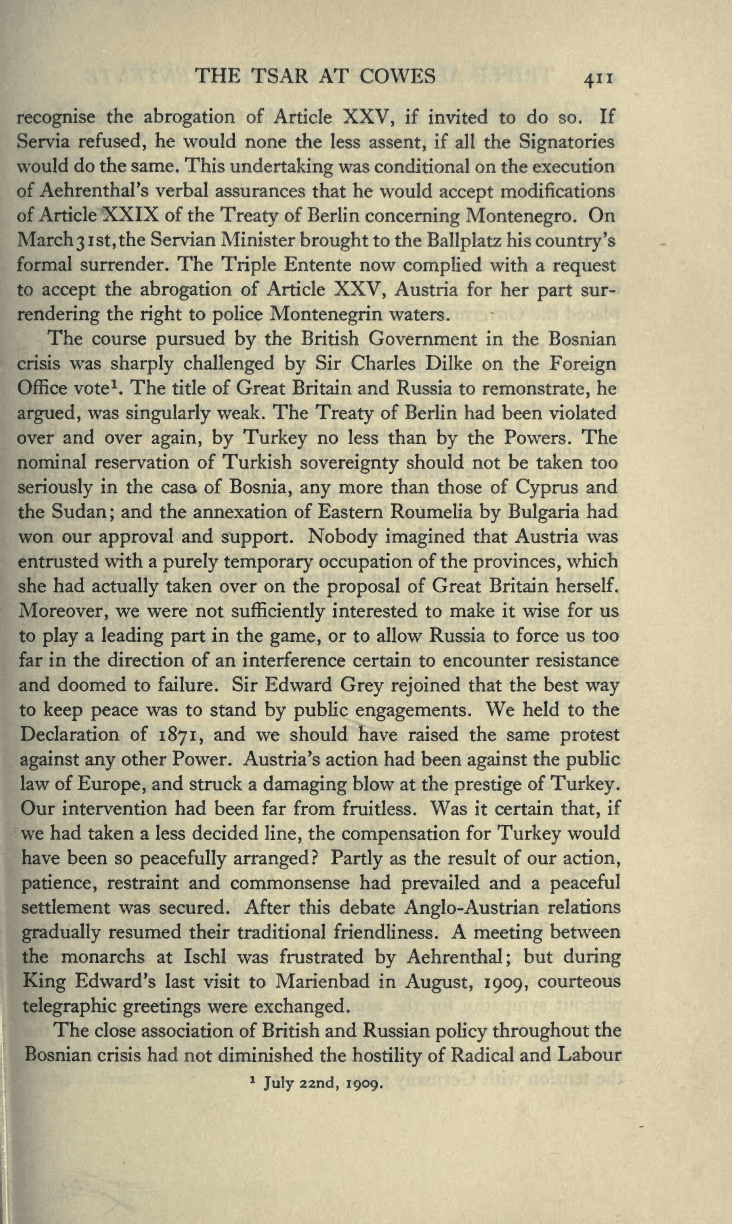
THE
TSAR AT COWES
411
recognise
the
abrogation
of
Article
XXV,
if
invited to
do
so. If
Servia
refused,
he
would none
the less
assent,
if
all
the
Signatories
would
do
the
same.
This
undertaking
was
conditional on
the
execution
of
Aehrenthal's verbal
assurances
that he would
accept
modifications
of
Article
XXIX of
the
Treaty
of
Berlin
concerning
Montenegro.
On
March
3
1
st,
the
Servian
Minister
brought
to the
Ballplatz
his
country's
formal
surrender.
The
Triple
Entente
now
complied
with
a
request
to
accept
the
abrogation
of
Article
XXV,
Austria
for
her
part
sur-
rendering
the
right
to
police
Montenegrin
waters.
The course
pursued
by
the
British Government
in
the
Bosnian
crisis
was
sharply
challenged by
Sir
Charles Dilke on
the
Foreign
Office vote
1
.
The title of
Great Britain
and
Russia to
remonstrate,
he
argued,
was
singularly
weak. The
Treaty
of
Berlin
had
been violated
over
and over
again, by
Turkey
no less than
by
the Powers.
The
nominal
reservation
of
Turkish
sovereignty
should
not
be
taken
too
seriously
in
the case>
of
Bosnia,
any
more
than those
of
Cyprus
and
the
Sudan
;
and
the annexation
of
Eastern Roumelia
by Bulgaria
had
won
our
approval
and
support.
Nobody
imagined
that Austria
was
entrusted with
a
purely temporary occupation
of the
provinces,
which
she
had
actually
taken over
on
the
proposal
of
Great Britain
herself.
Moreover,
we were not
sufficiently
interested
to
make
it
wise
for us
to
play
a
leading
part
in
the
game,
or
to
allow Russia
to
force
us
too
far in
the direction
of an
interference certain to
encounter resistance
and doomed to failure. Sir Edward
Grey rejoined
that the best
way
to
keep peace
was
to stand
by
public
engagements.
We
held to the
Declaration
of
1871,
and
we should have raised the same
protest
against any
other Power.
Austria's action
had
been
against
the
public
law
of
Europe,
and
struck
a
damaging
blow
at the
prestige
of
Turkey.
Our
intervention had been far from
fruitless.
Was
it certain
that,
if
we
had
taken
a
less decided
line,
the
compensation
for
Turkey
would
have been so
peacefully arranged?
Partly
as
the result
of our
action,
patience,
restraint and commonsense
had
prevailed
and a
peaceful
settlement was
secured. After this debate
Anglo-
Austrian
relations
gradually
resumed
their
traditional
friendliness. A
meeting
between
the monarchs
at Ischl was
frustrated
by
Aehrenthal;
but
during
King
Edward's
last
visit to
Marienbad in
August, 1909,
courteous
telegraphic
greetings
were
exchanged.
The
close association of British and Russian
policy
throughout
the
Bosnian
crisis had
not diminished the
hostility
of Radical
and
Labour
1
July
22nd,
1909.
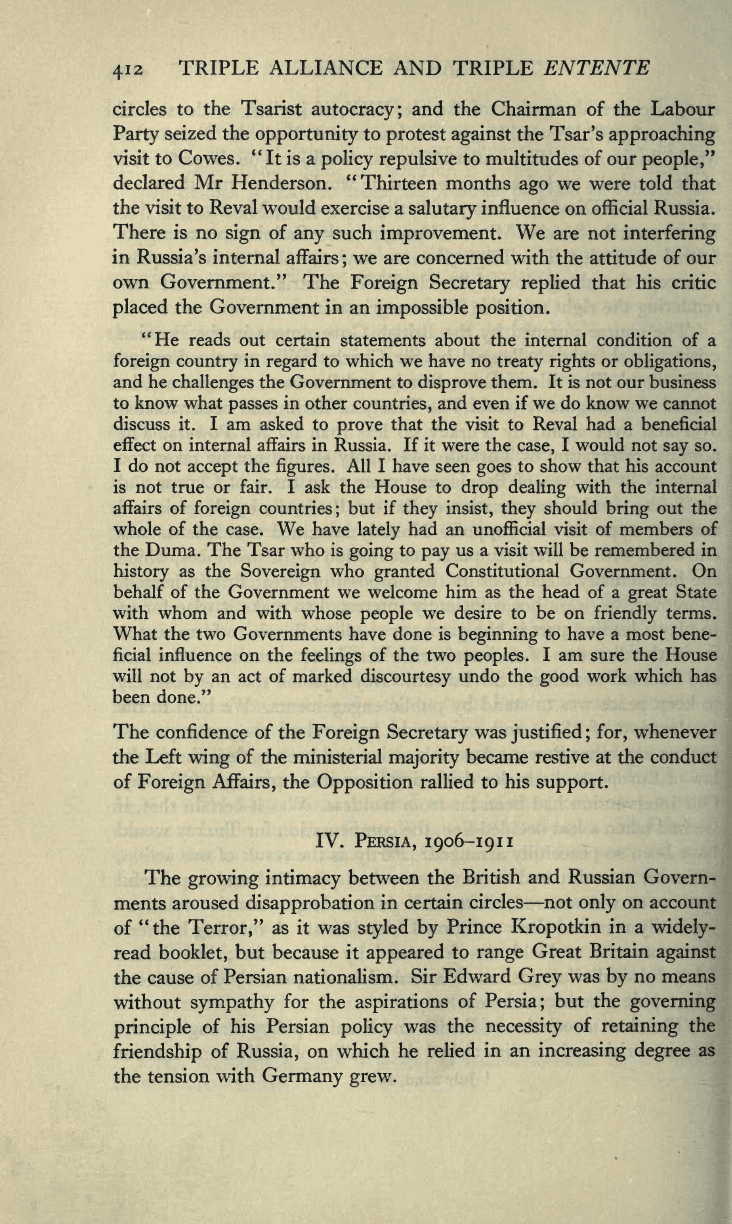
412
TRIPLE
ALLIANCE AND TRIPLE ENTENTE
circles
to
the
Tsarist
autocracy;
and
the Chairman of
the
Labour
Party
seized
the
opportunity
to
protest
against
the Tsar's
approaching
visit
to Cowes.
"
It
is a
policy
repulsive
to
multitudes
of our
people,"
declared
Mr
Henderson.
"Thirteen months
ago
we were told that
the visit
to Reval would
exercise
a
salutary
influence on official Russia.
There is no
sign
of
any
such
improvement.
We
are not
interfering
in
Russia's
internal affairs
;
we
are
concerned
with the attitude
of our
own
Government."
The
Foreign
Secretary replied
that
his
critic
placed
the
Government
in
an
impossible position.
"He
reads
out
certain statements about the internal condition of a
foreign country
in
regard
to which we have no
treaty
rights
or
obligations,
and he
challenges
the
Government to
disprove
them.
It
is
not
our business
to know what
passes
in
other
countries,
and
even
if
we
do know
we cannot
discuss it.
I
am
asked to
prove
that
the visit to Reval
had a
beneficial
effect on internal affairs in
Russia.
If
it were the
case,
I would not
say
so.
I do not
accept
the
figures.
All
I
have seen
goes
to show that his
account
is not true or
fair.
I
ask the House
to
drop
dealing
with
the internal
affairs of
foreign
countries;
but if
they
insist,
they
should
bring
out the
whole of the
case. We have
lately
had an unofficial visit of members of
the
Duma. The Tsar
who is
going
to
pay
us a visit will
be remembered
in
history
as the
Sovereign
who
granted
Constitutional Government. On
behalf of the
Government we welcome
him as the head
of
a
great
State
with whom and with
whose
people
we desire to be
on
friendly
terms.
What the two Governments have done is
beginning
to
have a most bene-
ficial influence on
the
feelings
of the two
peoples.
I am
sure the
House
will not
by
an
act
of
marked
discourtesy
undo the
good
work which
has
been
done."
The confidence
of
the
Foreign
Secretary
was
justified
; for,
whenever
the Left
wing
of
the ministerial
majority
became restive at the
conduct
of
Foreign
Affairs,
the
Opposition
rallied
to
his
support.
IV.
Persia,
1906-1911
The
growing intimacy
between the
British
and Russian
Govern-
ments
aroused
disapprobation
in
certain
circles
—
not
only
on
account
of "the
Terror,"
as it was
styled by
Prince
Kropotkin
in a
widely-
read
booklet,
but because it
appeared
to
range
Great Britain
against
the
cause
of Persian
nationalism.
Sir
Edward
Grey
was
by
no
means
without
sympathy
for
the
aspirations
of
Persia;
but the
governing
principle
of his Persian
policy
was the
necessity
of
retaining
the
friendship
of
Russia,
on
which he
relied
in
an
increasing
degree
as
the tension
with
Germany grew.
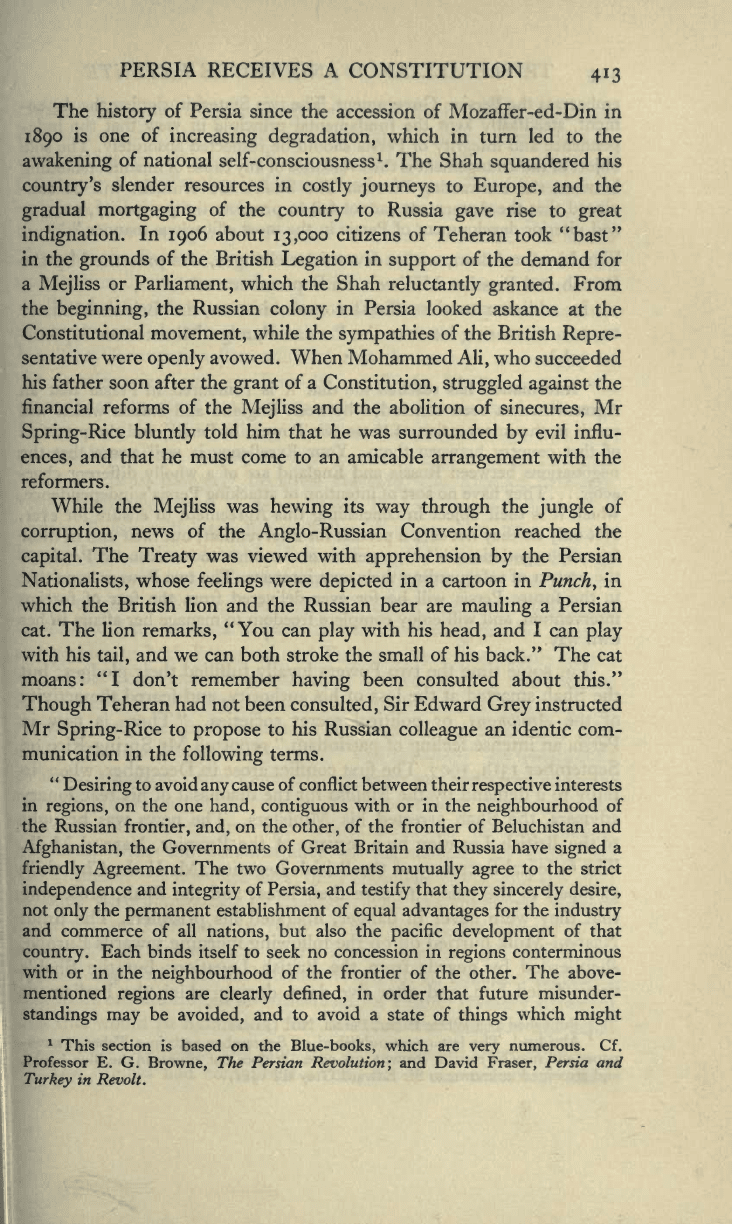
PERSIA
RECEIVES A
CONSTITUTION
413
The
history
of
Persia
since
the accession
of
MozafTer-ed-Din
in
1890
is
one of
increasing degradation,
which
in
turn
led
to
the
awakening
of
national
self-consciousness
1
.
The
Shah
squandered
his
country's
slender
resources in
costly
journeys
to
Europe,
and the
gradual
mortgaging
of
the
country
to Russia
gave
rise to
great
indignation.
In
1906
about
13,000
citizens
of
Teheran
took
"bast"
in the
grounds
of
the British
Legation
in
support
of
the
demand
for
a
Mejliss
or
Parliament,
which
the
Shah
reluctantly
granted.
From
the
beginning,
the Russian
colony
in Persia
looked
askance at the
Constitutional
movement,
while the
sympathies
of
the
British
Repre-
sentative were
openly
avowed. When
Mohammed
Ali,
who
succeeded
his
father soon after
the
grant
of a
Constitution,
struggled
against
the
financial
reforms
of
the
Mejliss
and
the abolition
of
sinecures,
Mr
Spring-
Rice
bluntly
told
him
that he was surrounded
by
evil
influ-
ences,
and
that
he
must
come
to
an
amicable
arrangement
with the
reformers.
While
the
Mejliss
was
hewing
its
way through
the
jungle
of
corruption,
news
of
the
Anglo-Russian
Convention reached the
capital.
The
Treaty
was viewed with
apprehension
by
the Persian
Nationalists,
whose
feelings
were
depicted
in
a cartoon
in
Punch
,
in
which
the British
lion
and the
Russian
bear are
mauling
a Persian
cat. The lion
remarks,
"You
can
play
with his
head,
and
I
can
play
with
his
tail,
and
we
can
both stroke the small
of his back."
The cat
moans:
"I
don't remember
having
been
consulted
about this."
Though
Teheran
had
not been
consulted,
Sir Edward
Grey
instructed
Mr
Spring-Rice
to
propose
to
his Russian
colleague
an identic com-
munication
in
the
following
terms.
"
Desiring
to avoid
any
cause
of
conflict between their
respective
interests
in
regions,
on
the one
hand,
contiguous
with or in the
neighbourhood
of
the Russian
frontier, and,
on the
other,
of
the frontier
of
Beluchistan
and
Afghanistan,
the Governments
of Great Britain and
Russia have
signed
a
friendly
Agreement.
The two
Governments
mutually agree
to the
strict
independence
and
integrity
of
Persia,
and
testify
that
they
sincerely
desire,
not
only
the
permanent
establishment
of
equal
advantages
for the
industry
and
commerce
of
all
nations,
but
also the
pacific
development
of that
country.
Each binds itself
to seek
no
concession in
regions
conterminous
with or
in
the
neighbourhood
of the frontier of
the
other.
The above-
mentioned
regions
are
clearly
defined,
in
order
that
future
misunder-
standings
may
be
avoided,
and
to avoid a
state
of
things
which
might
1
This section is
based on the
Blue-books,
which are
very
numerous.
Cf.
Professor
E. G.
Browne,
The Persian
Revolution;
and David
Fraser,
Persia
and
Turkey
in
Revolt.
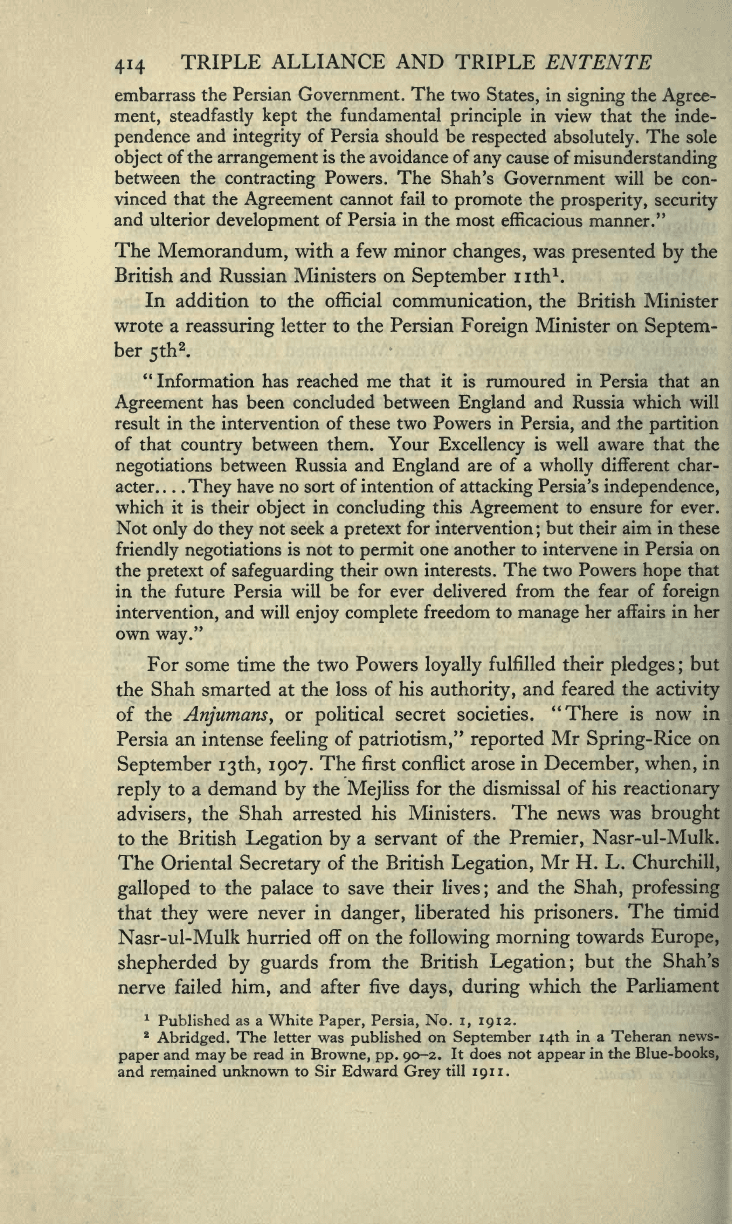
4H
TRIPLE
ALLIANCE AND TRIPLE
ENTENTE
embarrass
the
Persian Government. The two
States,
in
signing
the
Agree-
ment,
steadfastly kept
the fundamental
principle
in
view
that
the inde-
pendence
and
integrity
of Persia
should be
respected
absolutely.
The sole
object
of the
arrangement
is the avoidance
of
any
cause of
misunderstanding
between the
contracting
Powers. The Shah's
Government will
be
con-
vinced that
the
Agreement
cannot fail to
promote
the
prosperity,
security
and
ulterior
development
of
Persia
in
the most
efficacious manner."
The
Memorandum,
with
a
few
minor
changes,
was
presented
by
the
British and
Russian Ministers
on
September
nth
1
.
In
addition to
the official
communication,
the British Minister
wrote
a
reassuring
letter to the Persian
Foreign
Minister
on
Septem-
ber
5th
2
.
"Information has reached me that
it
is rumoured in
Persia
that an
Agreement
has
been
concluded
between
England
and
Russia
which will
result in the
intervention
of these two Powers in
Persia,
and the
partition
of that
country
between them.
Your
Excellency
is
well
aware that the
negotiations
between Russia
and
England
are
of a
wholly
different
char-
acter
They
have
no sort of intention
of
attacking
Persia's
independence,
which it is their
object
in
concluding
this
Agreement
to ensure
for
ever.
Not
only
do
they
not
seek
a
pretext
for
intervention
;
but their
aim in these
friendly
negotiations
is
not
to
permit
one another
to
intervene
in Persia
on
the
pretext
of
safeguarding
their
own
interests. The
two Powers
hope
that
in the
future
Persia will be
for
ever delivered
from
the
fear
of
foreign
intervention,
and will
enjoy
complete
freedom
to
manage
her
affairs
in her
own
way."
For
some time
the
two
Powers
loyally
fulfilled their
pledges
;
but
the
Shah
smarted at the
loss
of
his
authority,
and feared the
activity
of
the
Anjumans,
or
political
secret
societies.
"There is
now
in
Persia
an
intense
feeling
of
patriotism,"
reported
Mr
Spring-
Rice on
September
13th, 1907.
The first conflict
arose
in
December,
when,
in
reply
to
a demand
by
the
Mejliss
for
the
dismissal
of his
reactionary
advisers,
the
Shah
arrested
his
Ministers.
The news
was
brought
to the
British
Legation by
a
servant
of
the
Premier,
Nasr-ul-Mulk.
The
Oriental
Secretary
of
the British
Legation,
Mr
H. L.
Churchill,
galloped
to the
palace
to
save their
lives;
and the
Shah,
professing
that
they
were never in
danger,
liberated
his
prisoners.
The
timid
Nasr-ul-Mulk
hurried off
on
the
following
morning
towards
Europe,
shepherded by
guards
from
the
British
Legation;
but the
Shah's
nerve
failed
him,
and
after
five
days,
during
which the
Parliament
1
Published
as a White
Paper,
Persia,
No.
i,
1912.
2
Abridged.
The
letter
was
published
on
September 14th
in
a Teheran
news-
paper
and
may
be read in
Browne,
pp. 90-2.
It
does not
appear
in the
Blue-books,
and remained unknown
to Sir Edward
Grey
till
191
1.
